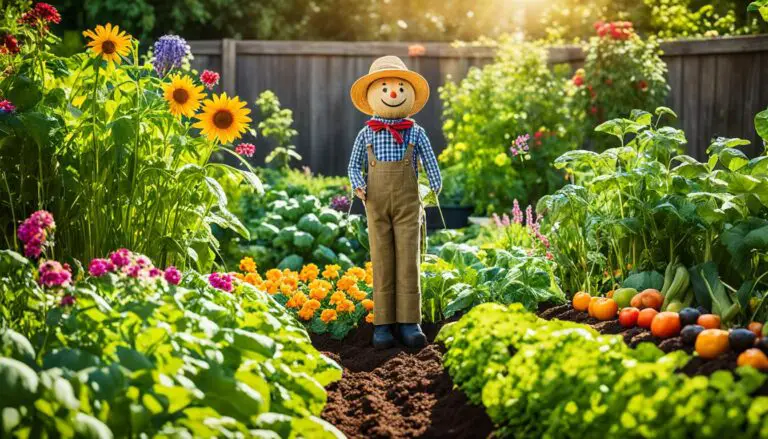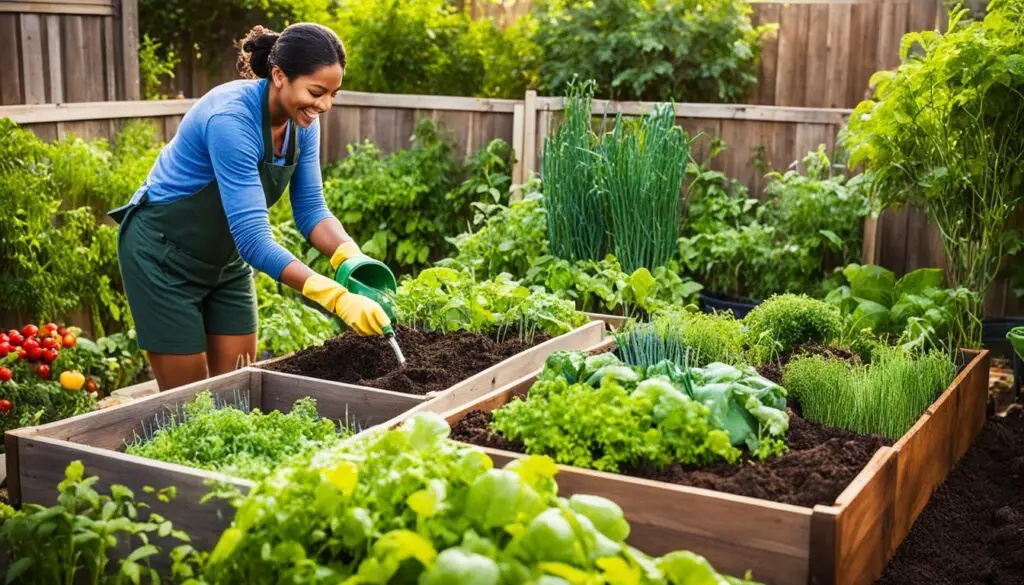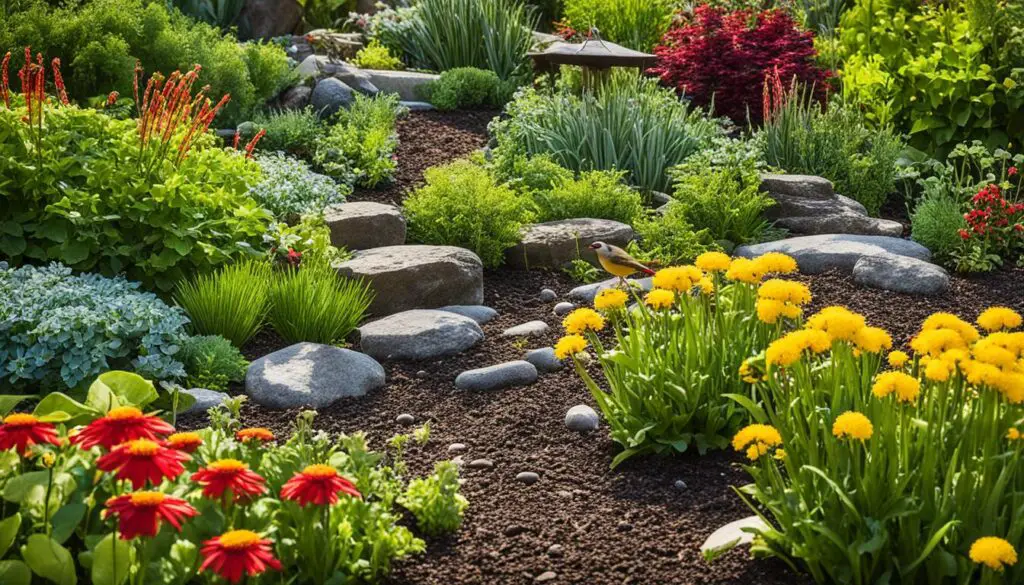Organic gardening is an environmentally friendly and sustainable approach to growing plants without the use of synthetic pesticides or fertilizers. It promotes the use of natural methods to nurture plants, protect soil health, and support biodiversity. In this section, we will explore the fundamentals of organic gardening for beginners and provide expert guidance on how to cultivate a thriving and sustainable garden.
Key Takeaways:
- Organic gardening focuses on using natural methods to nurture plants and protect soil health.
- It promotes biodiversity and supports the health of ecosystems.
- Organic gardening benefits the environment and produces healthier produce.
- Essential tools, soil preparation, and composting are important aspects of organic gardening.
- Natural pest control techniques, such as companion planting and crop rotation, can help manage pests and diseases.
Why Choose Organic Gardening?
Organic gardening offers a multitude of benefits that make it a compelling choice for gardeners. By embracing organic practices, you can contribute to a healthier environment, enjoy better quality produce, and support the well-being of ecosystems. Let’s explore these advantages in more detail:
- Reduced Environmental Impact: Unlike traditional gardening methods that rely on synthetic pesticides and fertilizers, organic gardening eliminates the use of harmful chemicals. By avoiding chemical inputs, organic gardening helps to preserve soil fertility, prevent water pollution, and reduce air contamination. This environmentally conscious approach contributes to the overall sustainability and health of our planet.
- Healthier Produce: Organic gardening produces fruits, vegetables, and herbs that are not only rich in flavor but also packed with essential nutrients. Studies have shown that organic produce tends to contain higher levels of vitamins, minerals, and antioxidants compared to conventionally grown crops. By choosing organic, you can nourish your body with wholesome, pesticide-free food that supports your well-being.
- Supporting Ecosystems: Organic gardening practices prioritize biodiversity and the preservation of natural habitats. By avoiding chemical pesticides, organic gardens create safe spaces for beneficial insects, birds, and other wildlife to thrive. The presence of these creatures helps to maintain a balanced ecosystem, control pest populations naturally, and enhance pollination. It’s a win-win situation for both your garden and the surrounding environment.
To truly grasp the impact of organic gardening, consider the following quote by renowned environmentalist Wendell Berry:
“The care of the Earth is our most ancient and most worthy, and after all our most pleasing responsibility. To cherish what remains of it and to foster its renewal is our only hope.”
By choosing organic gardening, you are actively participating in the care and stewardship of the Earth, ensuring a sustainable future for generations to come.
Promoting a Sustainable Future
Organic gardening is not just a personal pursuit; it is an opportunity to make a positive impact on the world around us. By embracing organic practices, we can minimize our environmental footprint, support our own health, and contribute to the overall well-being of the planet.
Next Steps: Getting Started
Are you excited to embark on your organic gardening journey? In the next section, we will provide you with essential tips and guidance to help you get started with organic gardening. From selecting the right tools to preparing your soil and creating a thriving compost pile, we’ll cover everything you need to know to set the foundation for success.
Getting Started with Organic Gardening
To successfully embark on your organic gardening journey, there are a few essential steps you need to take. Let’s explore these organic gardening tips to ensure your plants thrive in a sustainable and eco-friendly manner.
Gather Your Essential Tools
Before diving into the world of organic gardening, it’s important to equip yourself with the necessary tools. Here are a few essential tools to get started:
- Gardening gloves: Protect your hands while working with soil, plants, and potential prickly hazards.
- Hand trowel: An indispensable tool for digging holes, transplanting seedlings, and tending to small plants.
- Pruners: Keep your plants trimmed and healthy by investing in a pair of high-quality pruners.
Prepare Your Soil for Success
The foundation of a thriving organic garden lies in well-prepared soil. Here’s a step-by-step guide to preparing your soil:
- Remove weeds: Start by clearing the area of any weeds or unwanted vegetation to create a clean canvas for your new garden.
- Loosen the soil: Use a garden fork to loosen the soil, improving its structure and allowing for better aeration and water drainage.
- Add organic matter: Enhance the fertility and nutrient content of your soil by incorporating organic matter such as compost or well-rotted manure. This will provide the essential elements your plants need to thrive.
Remember, healthy soil is the key to healthy plants in organic gardening.
Embrace the Power of Composting
Composting is an integral part of organic gardening, and it’s an excellent way to recycle organic materials into nutrient-rich soil amendments. Here’s how you can start your own compost pile:
- Collect kitchen scraps: Save food scraps such as fruit peels, vegetable trimmings, and coffee grounds to add to your compost pile.
- Gather yard waste: Collect leaves, grass clippings, and small branches to balance the carbon-to-nitrogen ratio in your compost.
- Other organic materials: Consider adding other organic materials like shredded newspaper, eggshells, or straw to enrich your compost pile.
With time and proper care, your compost pile will transform into nutrient-dense “black gold” that will supercharge your plants.
By following these organic gardening tips, gathering the essential tools, preparing your soil, and embracing composting, you are laying the foundation for a successful and sustainable garden. Now that you’re equipped with the knowledge, it’s time to roll up your sleeves and start growing!
Organic Pest and Disease Prevention
One of the challenges of organic gardening is managing pests and diseases without the use of synthetic chemicals. Fortunately, there are many natural methods you can employ to protect your plants.
Companion Planting
Consider practicing companion planting, where certain plants are grown together to repel pests or attract beneficial insects. By strategically choosing companion plants, you create a natural balance that discourages pests and encourages a healthy garden ecosystem. For example, marigolds can be planted alongside tomatoes to deter nematodes, while herbs like basil can help repel whiteflies and aphids.
Crop Rotation
Another effective technique is crop rotation, where you avoid planting the same crop in the same spot for consecutive years. Crop rotation helps prevent the buildup of pests and diseases in the soil, as different crops have different nutrient needs, thereby disrupting the life cycles of pests and pathogens. For example, if you grow tomatoes in one area this year, consider planting beans or lettuce in that spot the following year.
| Key Benefits of Companion Planting and Crop Rotation |
|---|
| Repels pests naturally |
| Attracts beneficial insects |
| Disrupts pest and disease life cycles |
| Improves soil health and fertility |
| Reduces the need for synthetic pesticides |
| Promotes biodiversity in the garden |
By incorporating natural pest control methods like companion planting and crop rotation into your organic gardening practices, you can effectively manage pests and diseases while maintaining a healthy and thriving garden.
Conclusion
In conclusion, organic gardening for beginners offers a rewarding and fulfilling hobby that not only benefits you but also the environment. By embracing the principles of organic gardening, you can enjoy the numerous benefits of sustainable growing, including fresh and nutritious produce, reduced harm to the environment, and support for biodiversity.
As a beginner, it’s essential to start small and learn from your experiences. Be patient with the process, as organic gardening requires time and practice to develop the necessary skills and knowledge. Remember to prioritize the health of your soil by incorporating organic matter like compost or well-rotted manure. This improves soil fertility and structure, leading to healthier plants.
Additionally, explore natural pest control methods such as companion planting and crop rotation to prevent pest infestations and diseases without resorting to synthetic chemicals. By creating a balanced ecosystem in your garden, you can attract beneficial insects and birds that play a crucial role in managing pests.
Overall, organic gardening is a sustainable and eco-friendly approach that offers numerous benefits. It allows you to cultivate a thriving garden while promoting soil health, protecting the environment, and supporting biodiversity. So, put on your gardening gloves, grab your tools, and embark on this exciting journey of organic gardening. Happy gardening!
FAQ
What is organic gardening?
Organic gardening is a sustainable approach to growing plants without the use of synthetic pesticides or fertilizers. It promotes the use of natural methods to nurture plants, protect soil health, and support biodiversity.
Why is organic gardening beneficial?
Organic gardening is beneficial for several reasons. It helps reduce the environmental impact of traditional gardening practices by avoiding the use of harmful chemicals. Organic produce is also healthier to consume as it contains higher levels of vitamins, minerals, and antioxidants. Additionally, organic gardening supports the health of ecosystems by promoting biodiversity and providing habitats for beneficial insects and wildlife.
How do I get started with organic gardening?
To get started with organic gardening, gather essential tools like gardening gloves, hand trowel, and pruners. Prepare your soil by removing weeds, loosening it with a garden fork, and adding organic matter such as compost or well-rotted manure. Composting is also important to improve soil fertility. Collect kitchen scraps and other organic materials to create your own compost pile.
How can I manage pests and diseases in organic gardening?
In organic gardening, you can manage pests and diseases naturally. Consider practicing companion planting, where certain plants are grown together to repel pests or attract beneficial insects. Crop rotation is another effective technique to prevent the buildup of pests and diseases in the soil. Avoid planting the same crop in the same spot for consecutive years.



